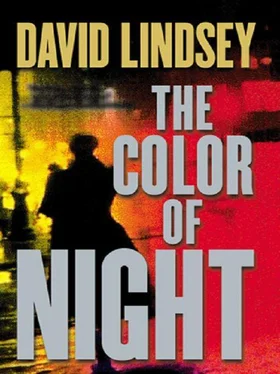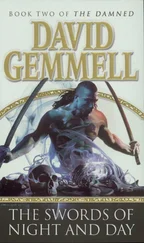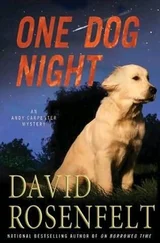David Lindsey - The Color of Night
Здесь есть возможность читать онлайн «David Lindsey - The Color of Night» весь текст электронной книги совершенно бесплатно (целиком полную версию без сокращений). В некоторых случаях можно слушать аудио, скачать через торрент в формате fb2 и присутствует краткое содержание. Жанр: Полицейский детектив, на английском языке. Описание произведения, (предисловие) а так же отзывы посетителей доступны на портале библиотеки ЛибКат.
- Название:The Color of Night
- Автор:
- Жанр:
- Год:неизвестен
- ISBN:нет данных
- Рейтинг книги:4 / 5. Голосов: 1
-
Избранное:Добавить в избранное
- Отзывы:
-
Ваша оценка:
- 80
- 1
- 2
- 3
- 4
- 5
The Color of Night: краткое содержание, описание и аннотация
Предлагаем к чтению аннотацию, описание, краткое содержание или предисловие (зависит от того, что написал сам автор книги «The Color of Night»). Если вы не нашли необходимую информацию о книге — напишите в комментариях, мы постараемся отыскать её.
The Color of Night — читать онлайн бесплатно полную книгу (весь текст) целиком
Ниже представлен текст книги, разбитый по страницам. Система сохранения места последней прочитанной страницы, позволяет с удобством читать онлайн бесплатно книгу «The Color of Night», без необходимости каждый раз заново искать на чём Вы остановились. Поставьте закладку, и сможете в любой момент перейти на страницу, на которой закончили чтение.
Интервал:
Закладка:
He watched her from every angle as they moved through the exhibition rooms, sometimes observing her from only a few feet away, sometimes through a doorway, sometimes glimpsing her through the movement of heads and bodies and limbs of the crowd. What he saw was a woman who was captivated by a form of art that, compared to other media, was an unobtrusive world apart. To genuinely appreciate drawings, one had to be attracted to their inherent subtlety, to their modesty and intimacy. Most collectors of drawings believed that in some elemental way a drawing was a direct link to the mind of the artist in a manner that other forms of expression could not be. When one peered closely enough at the accumulated lines of a drawn image, or even at a few solitary strokes, one could almost believe that one saw the intent of the artist, and sometimes his discipline and sometimes his abandon, in a way that was bracing in its immediacy.
In a world defined by an insatiable hunger to gorge its senses with explosions of color and fulmination of sound and unrelenting activity, looking intently at a drawing on a piece of paper was an almost ascetic act. Strand found it, in her, beguiling.
When there was only a single room of drawings left to see, he drifted back to her and they finished the exhibit together.
Outside the threat of rain had passed and the sun was bearing down through the heavy air. The humidity was so high that their sunglasses fogged over immediately when they put them on. Mara laughed about this and said she found the city’s semitropical atmosphere a challenge to feminine grace. On the other hand, she added, wiping off her sunglasses on the hem of her dress, she thought there was something sexy about the heat.
They returned to Strand’s house and sat for a few minutes in the air-conditioned library, sipping iced tea.
“Well, that was fun,” Mara said. “It was, uh, it was comfortable being with you.” Then, frowning, watching him closely, “I hope that doesn’t sound… odd to you.”
“No, not at all.” He smiled. “I know what you mean.”
Mara daubed at the sweat on her glass with her napkin, thinking.
“You don’t know,” she said tentatively, “how much I appreciate your asking me to have lunch here, with you and Meret. It’s the first normal thing I’ve done in… ages.”
“Normal?”
Her eyes roamed the bookshelves. “Well, maybe normal isn’t the right word, but, I don’t know… comfortable, normal…” She took a deep breath. “It felt… tranquil.”
She looked up cautiously to see how that might strike him.
He nodded.
“I’m just trying to say that it felt good to be included in something like that.” She shook her head. “With this really absurd divorce grinding on, sometimes I feel an absence of context, as though I’m just not quite meshing with… anything.” She stopped. “This is muddy water to you, isn’t it? I’m not making myself very clear.”
Strand nodded. “I’ve enjoyed today, too. It’s been a good thing, for both of us.”
She looked at her watch. “Well, the morning appointment has turned into most of the day.” She stood. “It’s been wonderful. Thank you very much, Harry Strand.”
The time of day that Harry Strand hated finally arrived. It used to be his favorite, the hour just before dusk when the sun was poised only a few degrees above the horizon and the sharp light of the southern spring relented to the inevitable demise of another day. In the garden of the courtyard, protected by the stone walls of the old house, shade had already enveloped the fountain and the palms, and the blue hues of evening were alchemizing the tropical greens of Romy’s garden into deepening shadows.
Romy’s garden. Romy’s time of day. Sometimes Strand still kept their ritual, sitting in the quiet with a glass of ice-chilled Scotch. But it wasn’t any good anymore. The companionship was gone, the exchanges of small concerns and expressions of small delights. The Scotch remained. More of it now than before, of course. It didn’t replace what he had had, but for a little while every day it dulled the regret of having lost it.
Tonight, instead of taking his drink into the courtyard, Strand took it into the library, put on a CD of Lucia di Lammermoor, and took down all of his books on the five artists who had created Mara Song’s drawings. He put all the books on the library table, pulled his chair close, took a sip of Scotch, and began searching through the books.
After nearly an hour, Strand went into the kitchen to pour another drink. He returned to the library, turned off all the lights except a small one, and kicked off his shoes, propping his feet on the seat of another chair. Lucia di Lammermoor was well into its tragic story as he let his eyes settle on the drawing illuminated by the dim light on the wall at the end of the library table. There, in a space especially created in the center of the bookshelves, was his own Maillol drawing, a conte study of a nude the artist had done in preparation for executing the lithographic illustrations for the French-language edition of Lucian of Samosota’s The Dialogues of the Courtesans.
The image was of a woman who, in the process of walking away from the viewer, turns in midstride and looks back. It was the first drawing that Strand and Romy had bought together, shortly after she’d come to live with him while he was in Vienna. He had discovered it in the home of an old Austrian banker whose family had retained Strand to appraise his art collection prior to selling his estate. It was a lovely thing, and when he’d shown it to Romy she had reacted to it passionately. She had become intrigued by the tenuous message implied in the turn of the woman’s hips, by the curiosity conveyed in the twist of her neck and her tilted shoulders, her head, bent slightly and turned to cast a sidelong glance at the viewer.
The number of hours Strand had sat here looking at this drawing during the last year was well into the hundreds. Or so it seemed. Though the house was full of art that they had collected during their years together, this single drawing held more of Romy’s soul than any of them; when he was in its presence, he was in Romy’s presence.
It was at this moment that Strand suddenly thought of Mara Song. She was the first woman since Romy who had worked her way unbidden into his thoughts. He was just superstitious enough to find that of significance, though he had no idea what significance to attach to it. Maybe it simply meant that it had been long enough, and Mara’s appearance at this point in his life was nothing more than a gift of time and circumstance.
CHAPTER 8
Within a few days of receiving Mara’s drawings, Strand finished his appraisal of her images and asked her to come over to review it. She came in the middle of the afternoon, and they talked about his conclusions and how he would approach the sale. Mara was still there when Meret left at five o’clock. They had drinks. They talked. Strand suggested they go to Chiara’s for dinner.
A few days after that Mara called him to say she had received legal papers from Italy that represented yet another hurdle in her complex divorce proceedings. Would he like to celebrate-quietly? She had learned of a Thai restaurant that might be good. They ended the evening talking over drinks in the garden of Strand’s house.
Gradually, with neither of them bringing attention to it, the subject of the sale of the drawings fell away. Mara returned the drawings to the bank vault. Strand didn’t mention it because the sale of the drawings was a conclusion and introduced a connection to the end of something. He didn’t ask Mara why she had dropped the subject.
The next few weeks passed quickly. Strand and Mara saw a lot of each other, each of them growing increasingly at ease with calling the other to suggest dinner at a favorite restaurant or a movie or just to get together at either of their homes for a meal, which often ran late.
Читать дальшеИнтервал:
Закладка:
Похожие книги на «The Color of Night»
Представляем Вашему вниманию похожие книги на «The Color of Night» списком для выбора. Мы отобрали схожую по названию и смыслу литературу в надежде предоставить читателям больше вариантов отыскать новые, интересные, ещё непрочитанные произведения.
Обсуждение, отзывы о книге «The Color of Night» и просто собственные мнения читателей. Оставьте ваши комментарии, напишите, что Вы думаете о произведении, его смысле или главных героях. Укажите что конкретно понравилось, а что нет, и почему Вы так считаете.












